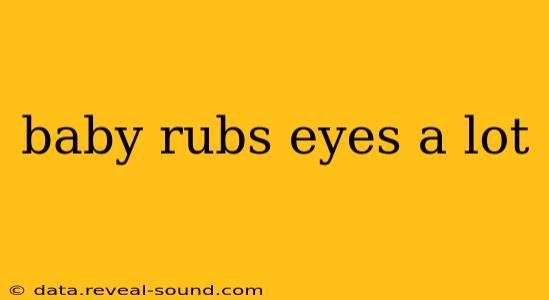It's common for parents to worry when their baby rubs their eyes excessively. While sometimes it's simply a developmental quirk or a sign of tiredness, other times it can indicate an underlying issue. Understanding the potential causes can ease parental anxiety and help determine when professional medical attention is necessary. This comprehensive guide explores the reasons behind excessive eye rubbing in babies, offering insights and guidance for concerned parents.
Why Does My Baby Rub Their Eyes So Much?
Excessive eye rubbing in babies can stem from various sources, ranging from simple irritants to more serious conditions. Let's explore some of the most frequent culprits:
-
Dry Eyes: A baby's tear ducts may not be fully developed, leading to dry, irritated eyes. This is particularly common in newborns and young infants. The rubbing is an attempt to lubricate the eyes and relieve discomfort.
-
Eye Discharge: Various conditions can cause eye discharge, from simple allergies to infections like conjunctivitis (pinkeye). The discharge can be irritating, prompting the baby to rub their eyes for relief.
-
Allergies: Exposure to allergens like pollen, dust mites, or pet dander can trigger allergic reactions in babies, leading to itchy, watery eyes and subsequent rubbing.
-
Teething: The discomfort associated with teething can sometimes manifest as increased eye rubbing, although the connection isn't always direct. The baby might rub their eyes due to general irritability or discomfort.
-
Blocked Tear Ducts: Sometimes, a baby's tear ducts can become blocked, leading to excessive tearing and eye irritation. This often presents as a watery eye along with the rubbing.
-
Blepharitis: This is an inflammation of the eyelids, which can cause redness, itchiness, and crusting around the eyes, leading to increased rubbing.
-
Other Infections: Beyond conjunctivitis, other eye infections can cause irritation and the urge to rub. These infections can be bacterial or viral.
What if My Baby's Eyes are Red and Swollen?
Redness and swelling, in addition to excessive eye rubbing, are significant warning signs that require immediate attention. This combination often points towards an infection or serious irritation. Do not attempt to self-treat; consult a pediatrician or ophthalmologist immediately.
When Should I Take My Baby to the Doctor?
It's crucial to seek professional medical advice if you notice any of the following alongside excessive eye rubbing:
- Persistent redness or swelling of the eyes.
- Significant eye discharge, especially if it's thick, yellow, or green.
- Fever.
- Sensitivity to light (photophobia).
- Cloudy or hazy appearance to the cornea (the clear front part of the eye).
- Eyelids that are stuck shut in the morning.
Don't delay seeking help if you have concerns. Early diagnosis and treatment are vital for preventing complications.
Is it Normal for Babies to Rub Their Eyes?
Some eye rubbing is normal, especially in babies as they explore their world and develop fine motor skills. However, persistent, excessive rubbing should be assessed by a medical professional to rule out any underlying medical conditions.
How Can I Help My Baby with Eye Rubbing?
If the eye rubbing seems to be due to dry eyes, you can try using a sterile saline solution to gently cleanse the area. However, never use any over-the-counter eye drops or ointments without first consulting your pediatrician. Keeping the baby's hands clean and their fingernails trimmed short can help minimize irritation.
My Baby's Eyelids are Stuck Together – What Should I Do?
This is a common sign of a mild eye infection and should be addressed by a doctor. Gently clean the eyelids with a warm, damp cloth before seeking medical advice.
This information is for educational purposes only and should not be considered medical advice. Always consult with a healthcare professional for any concerns about your baby's health. Regular checkups with your pediatrician are essential for monitoring your baby's development and overall well-being.
